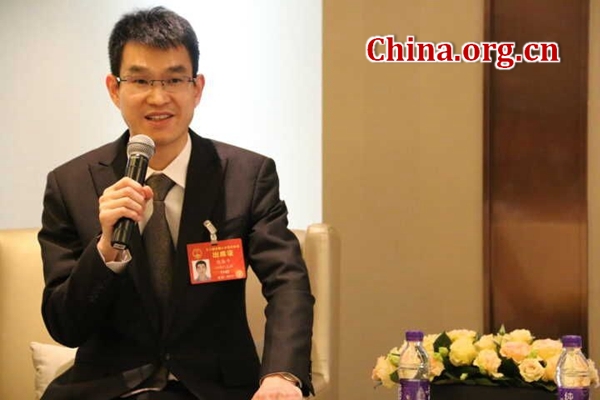CEO calls for more solar power to tackle rural poverty
china.org.cn / chinagate.cn by He Shan, March 14, 2017 Adjust font size:
|
|
|
Chen Kangping |
Chen Kangping, a deputy to the National People's Congress and CEO of JinkoSolar Holding Co, has called on the central government to expand solar power generation in rural areas to tackle rural poverty.
Chen made the remarks to China.org.cn on the sidelines of the ongoing session of the National People's Congress in Beijing.
Chen said his call came in line with the "No.1 central document," -- the first major policy document of each year released by the Central Committee of the Communist Party of China and the State Council, which read that the government will promote solar power generation as part of its efforts to boost use of new energy in rural areas.
Chen pointed that solar power generation is clean and can bring reliable income to the rural population.
Connected to the power grid, solar power generators installed on the roofs of rural households can not only meet their daily needs, but also supply surplus power to the network, earning an additional subsidy for them.
Chen projected that solar power generation will form a huge market worth more than 1 trillion yuan in the future.
He said that the use of solar power generation to fight poverty has great potential, but still faces three challenges.
First, poverty-fighting solar programs are often cash strapped and have difficulties obtaining finance. Second, to improve power generation facilities in poverty-stricken areas is difficult. Third, the government sets a very limited quota for solar power projects to fight poverty in rural areas.
Chen suggested ministries such as the National Committee of Development and Reform and the National Energy Administration should expand the construction of solar power plants to fight poverty. Moreover, banks should grant more support to such programs.
He also suggested that local governments should make full use of open spaces and roofs of public structures in rural areas to install generators.
By the end of 2016, JinkoSolar had rolled out poverty-fighting solar programs in 68 villages in five provinces and autonomous regions, including Jiangxi, Zhejiang, Anhui, Guizhou and Guangxi, benefitting nearly 8,000 households.
JinkoSolar has made an exemplary case in Shangrao, Jiangxi Province. The company has installed and maintained solar panels for local villagers in a mountain area in Shangrao and helped them connect generators to the local electricity network.
"This has brought villagers an income of about 4,000 yuan each year, which is quite a big allowance to support them," said Chen.
